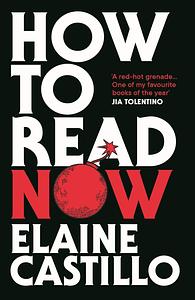Take a photo of a barcode or cover
If there’s anything I love more than razor-sharp essays, it’s an essay collection that challenges you, forces you to interrogate the parts of yourself you didn’t yet know need to be interrogated. I walked away from this with more questions than answers - and that’s not a bad thing! It’s a book ultimately about how we read - personally, collectively, institutionally. I can’t wait to read it again.
Not for me. (1) There is too much sarcasm in the essays, and I think the writer put too many notes in brackets. For example, at one point, she was discussing how we shouldn’t separate the Nobel prize winner’s political stance from his works, which was quite interesting, but the next minute she started talking about her mom and put the notes in brackets with sarcasm.(2) I’m not familiar with the American TV shows she’s referencing. (3) I would still like to read her memoir.
challenging
informative
reflective
slow-paced
3.5 stars - many of Castillo's references went over my head, her writing style could be inaccessible, and I disagreed with some of her points (e.g. against reading trashy books), but her central thesis that art is and should be viewed with a political lens was thought-provoking. I read this while in the UK and believe it deepened my experience, though likely lessened my pleasure by opening my eyes to patterns and perspectives I hadn't considered, e.g., the presence or absence of people of color in the National Gallery's paintings.
This book surprised me. On the one hand, Castillo's tone is young and at times informal (throwing out modern slang phrases and the occasional "bitch" here and there); at the same time, her sentences often are Dickensian, one sentence encompassing an entire paragraph because of all of the parenthetical and em-dash phrases. That habit plus the global organization within essays made the train of thought difficult to follow sometimes.
My mind is very much parenthetical, so I have the same tendency in my own writing. I also have a good grasp of sentence diagramming. But it was tough keeping up with where the subject of the sentence was once I finally got to the verbs.
But perhaps I'm not the expected reader, as Castillo would say. I did learn quite a bit from the indigenous history she laid down in each chapter. I know it doesn't sound like a 4-star survey, but her content is generally good and worth reading. I don't feel qualified to go into a longer discussion of it (plus I'm tired and want to go to bed).
My mind is very much parenthetical, so I have the same tendency in my own writing. I also have a good grasp of sentence diagramming. But it was tough keeping up with where the subject of the sentence was once I finally got to the verbs.
But perhaps I'm not the expected reader, as Castillo would say. I did learn quite a bit from the indigenous history she laid down in each chapter. I know it doesn't sound like a 4-star survey, but her content is generally good and worth reading. I don't feel qualified to go into a longer discussion of it (plus I'm tired and want to go to bed).
Incredibly mixed on this book. Some of the essays are incredibly strong, some I felt defensive about and didn't quite agree with (she *really* doesn't like Didion), and a few went pretty deep on books or movies I'm not familiar with.
It's on the latter that I struggled: at times an essay would read like the first draft of a college level paper on the selected book/movie/TV show, where she was still working out her emotional reactions to it, when the essay could have been stronger as less personal and more universal. I would have been totally into a book that was just a tad bit more general about the importance of seeing colonialist literature for what it is. Or, she could have turned the book into more of a memoir -- which I would have also been totally into.
It just could have used a more concrete decision on how personal/emotional it should be and then editing furthering that decision.
It's on the latter that I struggled: at times an essay would read like the first draft of a college level paper on the selected book/movie/TV show, where she was still working out her emotional reactions to it, when the essay could have been stronger as less personal and more universal. I would have been totally into a book that was just a tad bit more general about the importance of seeing colonialist literature for what it is. Or, she could have turned the book into more of a memoir -- which I would have also been totally into.
It just could have used a more concrete decision on how personal/emotional it should be and then editing furthering that decision.
Wowowowow! I have so many thoughts but this book deserves a properly thought out review, so I will sit with my notes and my feelings. This book is a battle cry and I fucking loved it.
emotional
informative
inspiring
reflective
medium-paced
challenging
informative
reflective
medium-paced








